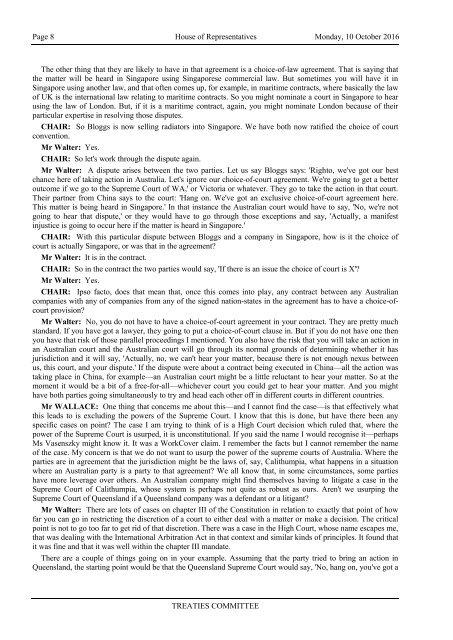Proof Committee Hansard
2d908Ic
2d908Ic
You also want an ePaper? Increase the reach of your titles
YUMPU automatically turns print PDFs into web optimized ePapers that Google loves.
Page 8 House of Representatives Monday, 10 October 2016<br />
The other thing that they are likely to have in that agreement is a choice-of-law agreement. That is saying that<br />
the matter will be heard in Singapore using Singaporese commercial law. But sometimes you will have it in<br />
Singapore using another law, and that often comes up, for example, in maritime contracts, where basically the law<br />
of UK is the international law relating to maritime contracts. So you might nominate a court in Singapore to hear<br />
using the law of London. But, if it is a maritime contract, again, you might nominate London because of their<br />
particular expertise in resolving those disputes.<br />
CHAIR: So Bloggs is now selling radiators into Singapore. We have both now ratified the choice of court<br />
convention.<br />
Mr Walter: Yes.<br />
CHAIR: So let's work through the dispute again.<br />
Mr Walter: A dispute arises between the two parties. Let us say Bloggs says: 'Righto, we've got our best<br />
chance here of taking action in Australia. Let's ignore our choice-of-court agreement. We're going to get a better<br />
outcome if we go to the Supreme Court of WA,' or Victoria or whatever. They go to take the action in that court.<br />
Their partner from China says to the court: 'Hang on. We've got an exclusive choice-of-court agreement here.<br />
This matter is being heard in Singapore.' In that instance the Australian court would have to say, 'No, we're not<br />
going to hear that dispute,' or they would have to go through those exceptions and say, 'Actually, a manifest<br />
injustice is going to occur here if the matter is heard in Singapore.'<br />
CHAIR: With this particular dispute between Bloggs and a company in Singapore, how is it the choice of<br />
court is actually Singapore, or was that in the agreement?<br />
Mr Walter: It is in the contract.<br />
CHAIR: So in the contract the two parties would say, 'If there is an issue the choice of court is X'?<br />
Mr Walter: Yes.<br />
CHAIR: Ipso facto, does that mean that, once this comes into play, any contract between any Australian<br />
companies with any of companies from any of the signed nation-states in the agreement has to have a choice-ofcourt<br />
provision?<br />
Mr Walter: No, you do not have to have a choice-of-court agreement in your contract. They are pretty much<br />
standard. If you have got a lawyer, they going to put a choice-of-court clause in. But if you do not have one then<br />
you have that risk of those parallel proceedings I mentioned. You also have the risk that you will take an action in<br />
an Australian court and the Australian court will go through its normal grounds of determining whether it has<br />
jurisdiction and it will say, 'Actually, no, we can't hear your matter, because there is not enough nexus between<br />
us, this court, and your dispute.' If the dispute were about a contract being executed in China—all the action was<br />
taking place in China, for example—an Australian court might be a little reluctant to hear your matter. So at the<br />
moment it would be a bit of a free-for-all—whichever court you could get to hear your matter. And you might<br />
have both parties going simultaneously to try and head each other off in different courts in different countries.<br />
Mr WALLACE: One thing that concerns me about this—and I cannot find the case—is that effectively what<br />
this leads to is excluding the powers of the Supreme Court. I know that this is done, but have there been any<br />
specific cases on point? The case I am trying to think of is a High Court decision which ruled that, where the<br />
power of the Supreme Court is usurped, it is unconstitutional. If you said the name I would recognise it—perhaps<br />
Ms Vasenszky might know it. It was a WorkCover claim. I remember the facts but I cannot remember the name<br />
of the case. My concern is that we do not want to usurp the power of the supreme courts of Australia. Where the<br />
parties are in agreement that the jurisdiction might be the laws of, say, Calithumpia, what happens in a situation<br />
where an Australian party is a party to that agreement? We all know that, in some circumstances, some parties<br />
have more leverage over others. An Australian company might find themselves having to litigate a case in the<br />
Supreme Court of Calithumpia, whose system is perhaps not quite as robust as ours. Aren't we usurping the<br />
Supreme Court of Queensland if a Queensland company was a defendant or a litigant?<br />
Mr Walter: There are lots of cases on chapter III of the Constitution in relation to exactly that point of how<br />
far you can go in restricting the discretion of a court to either deal with a matter or make a decision. The critical<br />
point is not to go too far to get rid of that discretion. There was a case in the High Court, whose name escapes me,<br />
that was dealing with the International Arbitration Act in that context and similar kinds of principles. It found that<br />
it was fine and that it was well within the chapter III mandate.<br />
There are a couple of things going on in your example. Assuming that the party tried to bring an action in<br />
Queensland, the starting point would be that the Queensland Supreme Court would say, 'No, hang on, you've got a<br />
TREATIES COMMITTEE















